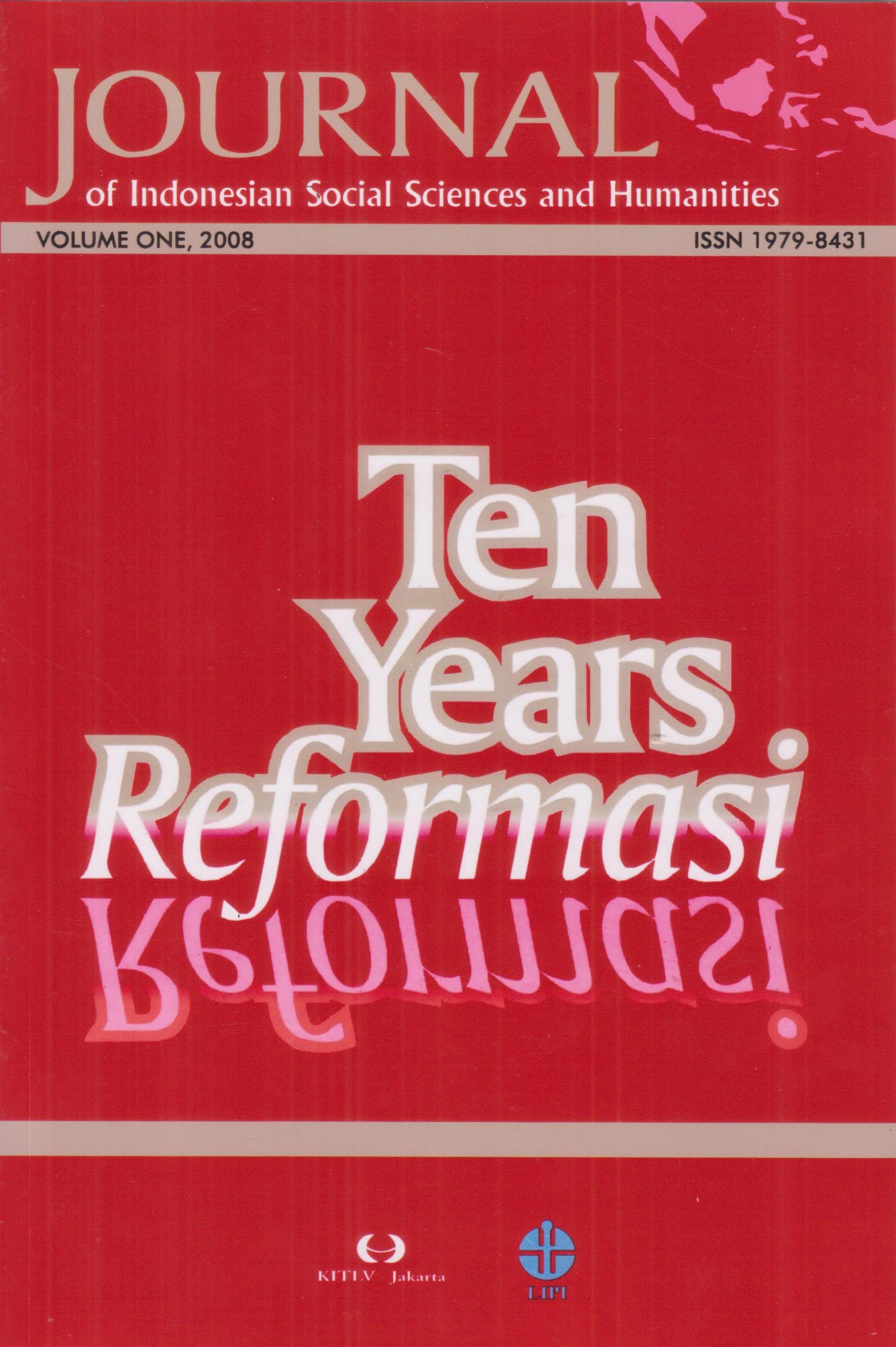Identity Politics, Citizenship and the Soft State in Indonesia: an Essay
Keywords:
Identity Politics , Citizenship, Decentralization, Ethnic Conflict, IndonesiaAbstract
Since 1998, administrative decentralisation, regional autonomy and ethnic and religious conflicts in areas outside Java have put identity politics high on the political agenda in Indonesia. This paper examines various expressions of these new identity politics and how they are related to, and derived from, older colonial concepts and categories. Examples from Riau and Bali illustrate how ethnic and religious repertoires are used to express political ambitions and mobilise popular support. Since 1998 Indonesia also witnessed a successful transition to electoral democracy. Whether democracy will take root in a more substantial way depends on the extent to which a notion of citizenship can be reinforced. It is argued that this notion of citizenship can only be maintained through the strengthening of the rule of law. In this respect it is also important to focus on the uneasy relationship between electoral democracy and ethnic and religious sentiments that tend to give far more attention to exclusive group interests while excluding a shared sense of citizenship. The paper concludes that democracy and citizenship, which are based on the rule of law, can only be achieved by strengthening the administrative and law-enforcing capacity of the state.
References
Aragon, Lorraine. 2001. 'Communal Violence in Poso, Central Sulawesi, Where People Eat Fish and Fish Eat People'. Indonesia 72: 4579.
Azra, Azyumardi and Wayne Hudson (eds). 2008. Islam Beyond Conflict: Indonesian Islam and Western Political Theory. Aldershot: Ashgate.
Barker, Joshua and Gerry van Klinken. 2007. 'State and Society in Indonesia'. Unpublished.
Bubandt, Nils. 2001. 'Decentralisation, Conflict, and the New Politics of Tradition in North Maluku'. Copenhagen: NIAS.
Connor, Linda and Adrian Vickers. 2003. 'Crisis, Citizenship and Cosmopolitanism: Living in a Local and Global Risk Society in Bali'. Indonesia 75: 153180.
Davidson, Jamie. 2008. From Rebellion to Riots: Collective Violence on Indonesian Borneo. Madison: University of Wisconsin Press.
Duncan, Christopher. 2005. 'The other Maluku: Chronologies of Conflict in North Maluku'. Indonesia 60: 5380.
Eindhoven, Myrna. 2007. 'New Colonizers? Identity, Representation and Government in post-New Order Mentawai Archipelago', in H Schulte Nordholt and G van Klinken (eds). Renegotiating Boundaries: Local Politics in post-Suharto
Indonesia. Leiden: KITLV Press, pp. 6789.
Elson, RE. 2008. The Idea of Indonesia: a History. Cambridge: Cambridge University Press.
Faucher, Carole. 2007. 'Contesting Boundaries in the Riau archipelago', in H Schulte Nordholt and G van Klinken (eds). Renegotiating Boundaries: Local Politics in post-Suharto Indonesia. Leiden: KITLV Press, pp. 44358.
Hadiz, Vedi. 2008. 'How Far to Meaningful Democracy'. Inside Indonesia 92.
Hedman, Eva-Lotte. 2006. In the Name of Civil Society: From Free Election Movements to People Power in the Philippines. Honolulu: University of Hawai'i Press.
Herriman, Nicholas. 2007. 'A Din of Whispers: Community, State Control and Violence in Indonesia'. PhD thesis. University of Western Australia.
International Crisis Group (ICG). 2008. 'Indonesia: Communal Tension in Papua'. Brussels/Jakarta: Asia Report 154.
Klinken, Gerry van. 2007a. Communal Violence and Democratization in Indonesia: Small Town Wars. London/New York: Routledge.
--------. 2007b. 'The return of the Sultans: the Communitarian Turn in Local Politics', in J Davidson and D Henley (eds). The Revival of Tradition in Indonesian Politics: the Development of Adat from Colonialism to Indigenism. New York: Routledge, pp. 14969.
Mietzner, Marcus. 2005. 'Local Democracy'. Inside Indonesia 85.
--------. 2007. 'Party Financing in post-Soeharto Indonesia: Between State Subsidy and Political Corruption'. Contemporary Southeast Asia 29: 23863.
Priyono AE, Willy Purna Samadhi, Olle Tnquist et al. (eds). 2007. Making Democracy Meaningful: Problems and Options in Indonesia. Yogyakarta: PCD Press.
Schulte Nordholt, Henk. 2004. 'Decentralisation in Indonesia: Less State, More Democracy?' in John Harris, Kristian Stokke and Olle Tnquist (eds). Politicising Democracy: the new local politics of democratization. New York: Palgrave, pp. 2950.
--------. 2007. Bali an Open Fortress 19952005: Regional Autonomy, Electoral Democracy and Entrenched Identities. Singapore: NUS Press.
--------. 2008. Indonesina Soeharto: Reformasi en Restauratie. Amsterdam: Bert Bakker.
Sidel, John. 2006. Riots, Pogroms, Jihad: Religious Violence in Indonesia. Ithaca/ London: Cornell University Press.
Slater, Dan. 2004. 'Indonesia's accountability trap: Party cartels and presidential power after democratic transition'. Indonesia 78: 6192.
Spyer, Patricia. 2002. 'Fire without Smoke and Other Phantoms of Ambon's Violence: Media Effect, Agency and the Work of Imagination'. Indonesia 74: 2136.
Suleiman, Ezra. 2003. Dismantling Democratic States. Princeton/Oxford: Princeton University Press.
Tomagola, TA. 1999. 'Tragedi Maluku Utara'. Masyarakat Indonesia 25: 289302.
Ufen, Andreas. 2008. 'Roots of democracy'. Inside Indonesia 92.
Downloads
Published
Issue
Section
License
Copyright (c) 2008 Henk Schulte Nordholt

This work is licensed under a Creative Commons Attribution-ShareAlike 4.0 International License.
Authors who publish with this journal agree to the following terms:
1. Authors retain copyright and grant the journal right of first publication with the work simultaneously licensed under an Attribution-ShareAlike 4.0 International (CC BY-SA 4.0) license. This license allows others to remix, adapt, and build upon the work, as long as they credit the author and license their new creations under the same terms.
2. Authors may enter into separate, additional contractual arrangements for the non-exclusive distribution of the journal’s published version of the work (e.g., posting it to an institutional repository or including it in a book), provided there is an acknowledgment of its initial publication in this journal.
3. Authors are permitted and encouraged to post their work online (e.g., in institutional repositories or on their personal website) prior to and during the submission process, as this can lead to productive exchanges and increase citations of the published work (See The Effect of Open Access ).


















